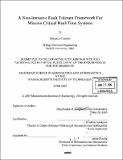| dc.contributor.advisor | I. Kristina Lundqvist. | en_US |
| dc.contributor.author | Gorelov, Sébastien | en_US |
| dc.contributor.other | Massachusetts Institute of Technology. Dept. of Aeronautics and Astronautics. | en_US |
| dc.date.accessioned | 2006-03-29T18:45:19Z | |
| dc.date.available | 2006-03-29T18:45:19Z | |
| dc.date.copyright | 2005 | en_US |
| dc.date.issued | 2005 | en_US |
| dc.identifier.uri | http://hdl.handle.net/1721.1/32447 | |
| dc.description | Thesis (S.M.)--Massachusetts Institute of Technology, Dept. of Aeronautics and Astronautics, 2005. | en_US |
| dc.description | Includes bibliographical references (p. 85-87). | en_US |
| dc.description.abstract | The need for dependable real-time systems for embedded application is growing, and, at the same time, so does the amount of functionality required from these systems. As testing can only show the presence of errors, not their absence, higher levels of system dependability may be provided by the implementation of mechanisms that can protect the system from faults. We present a framework for the development of fault tolerant mission critical real-time systems that provides a structure for flexible, efficient and deterministic design. The framework leverages three key knowledge domains: firstly, a software concurrency model, the Ada Ravenscar Profile, which guarantees deterministic behavior; secondly, the design of a hardware scheduler, the RavenHaRT kernel, which further provides deadlock free inter-task communication management; and finally, the design of a hardware execution time monitor, the Monitoring Chip, which provides non-intrusive error detection. To increase service dependability, we propose a fault tolerance strategy that uses multiple operating modes to provide system-level handling of timing errors. The hierarchical set of operating modes offers different gracefully degraded levels of guaranteed service. This approach relies on the elements of the framework discussed above and is illustrated through a sample case study of a generic navigation system. | en_US |
| dc.description.statementofresponsibility | by Sébastien Gorelov. | en_US |
| dc.format.extent | 92 p. | en_US |
| dc.format.extent | 5678798 bytes | |
| dc.format.extent | 5683372 bytes | |
| dc.format.mimetype | application/pdf | |
| dc.format.mimetype | application/pdf | |
| dc.language.iso | eng | en_US |
| dc.publisher | Massachusetts Institute of Technology | en_US |
| dc.rights | M.I.T. theses are protected by copyright. They may be viewed from this source for any purpose, but reproduction or distribution in any format is prohibited without written permission. See provided URL for inquiries about permission. | en_US |
| dc.rights.uri | http://dspace.mit.edu/handle/1721.1/7582 | |
| dc.subject | Aeronautics and Astronautics. | en_US |
| dc.title | A non-intrusive fault tolerant framework for mission critical real-time systems | en_US |
| dc.type | Thesis | en_US |
| dc.description.degree | S.M. | en_US |
| dc.contributor.department | Massachusetts Institute of Technology. Department of Aeronautics and Astronautics | |
| dc.identifier.oclc | 61719851 | en_US |
